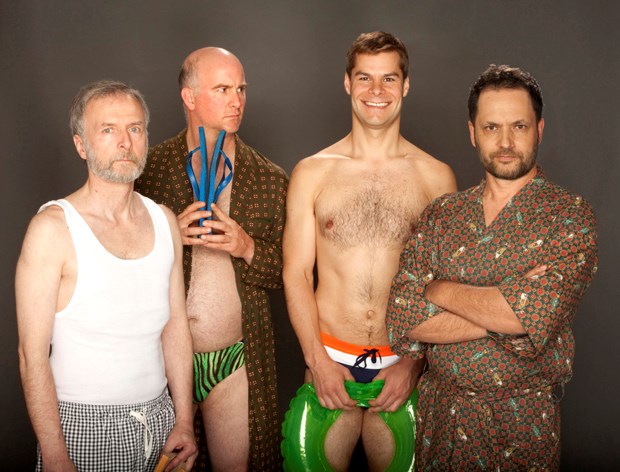Penelope, Sept. 25-Oct. 13 at The Cultch, 1895 Venables St., Vancouver. Tickets from $18 available at tickets. thecultch.com or by calling the box office at 604-251-1363.
Some 3,000 years before reality TV dating show The Bachelorette, there was The Odyssey.
Homer's epic poem follows Odysseus on his decade-long journey back to Ithaca after the Trojan War. Meanwhile, 108 rowdy male suitors have set up camp at his home and, assuming him dead, are vying for his wife Penelope's hand in marriage.
This peripheral storyline of competitive courtship in the Greek myth served as inspiration for the 2010 play Penelope by Irish playwright Enda Walsh.
The show opens the 2013/14 season at The Cultch, also marking its Canadian premiere. Produced by Vancouverbased Rumble Theatre, Penelope straddles the line between classical and contemporary, comedy and drama.
"The play has a wonderful balance of beauty and brutality, it's very funny and it's very terrible at the same time," explains Rumble Theatre's artistic director Stephen Drover.
When the curtain opens, it is 11:30 a.m. and already a scorching 35 degrees. At the bottom of a drained out swimming pool on a Greek island stand four men sporting neon Speedos, open robes and flip-flops. They are the last remaining suitors still competing to win over the long-suffering Penelope, who continues to wait faithfully for her husband. On this day, the four men realize that Odysseus' return is imminent.
"So they decide on this final day to band together and help each other win, rather than live in this singular competition where it's every man for himself," Drover says. The rationale behind their unlikely cooperation is if one man can win Penelope's love, Odysseus will spare all their lives when he arrives home to find them enjoying his wealth and courting his wife.
On the surface, Penelope is a comedy. The four men preen and posture in Odysseus' empty swimming pool, which they have transformed into a man cave complete with a barbecue, booze and blaring music.
"There's something ridiculous about these four guys who haven't gone off to war like Odysseus has, but they've stayed at home and what kind of self-important myths have they created about themselves," Drover says.
But beyond the revealing swimwear, feats of strength and snide insults are darker themes as the characters begin to face their true selves.
"These men realize that they've led pretty terrible, unworthy lives and they have about 45 minutes to redeem themselves before they're all killed," Drover says. "These men are forced to look at themselves and forced to admit, finally, once and for all, 'This is who I am and I've been running away from that truth all my life.'" The self-reflective script is one reason Rumble Theatre was drawn to Penelope in the first place.
"I really love plays that are really about probing, I suppose, our inner makeup and our inner psyche and really digging into what it means to be human," Drover says, adding that he is also keen on making international plays accessible to local theatre-goers.
"Why should a Vancouverite have to go to London to see a great script from Europe? We should be doing them here."
Penelope is no doubt a contemporary play, as evidenced by references to CDs and Lexus cars, but Drover says the show also has a classical flavour inspired by the original source material.
"There's something also very ancient Greek about it where there's prophecy and there's the sense that the gods are going to take vengeance on us," he says. "So it sits in a strange intersection of contemporary and classical sensibilities."
Audiences can expect to laugh out loud, while at the same time witnessing incisive observations about human - specifically male - behaviour, Drover says.
"My biggest hope is that people leave the theatre talking about the things that the play wants to talk about," he says. "Not about the play itself, but about life and death and God and heaven and hell."
For those unfamiliar with Homeric legends, Drover assures that viewers needn't understand The Odyssey in order to enjoy Penelope any more than they would need to know Hamlet to enjoy The Lion King.



